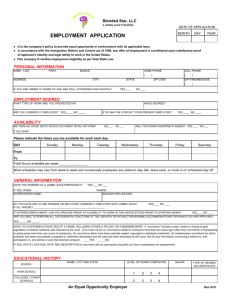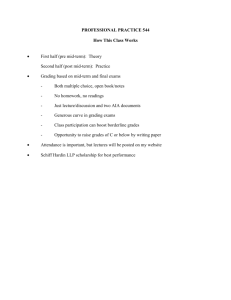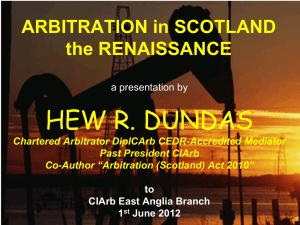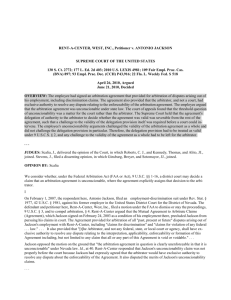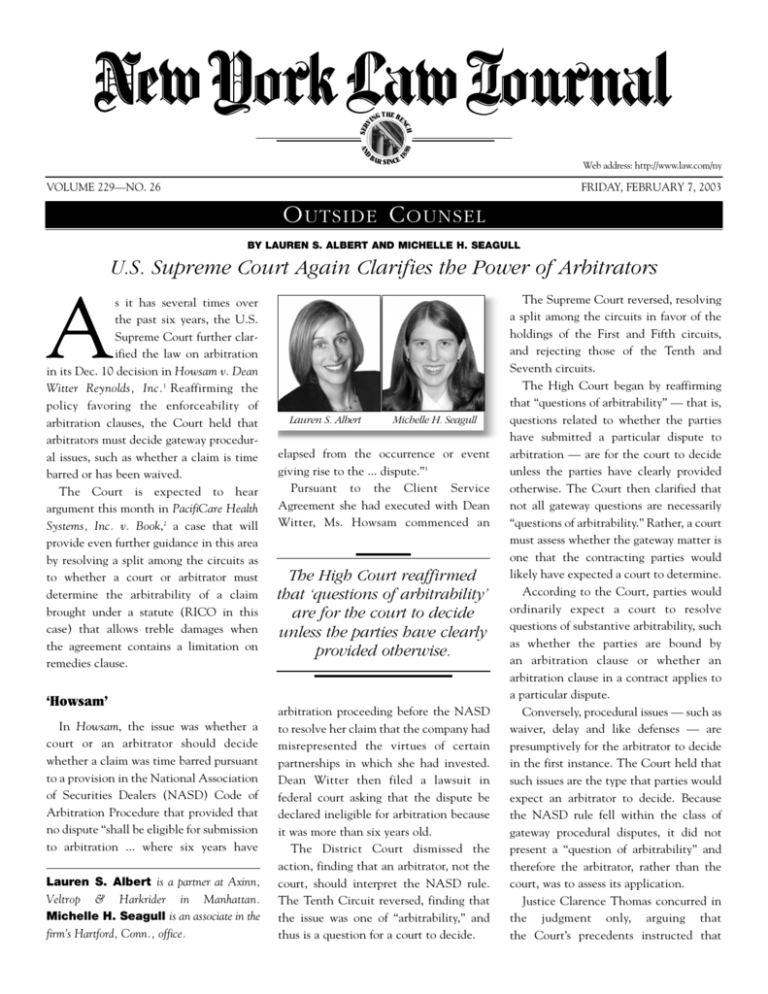
AND
88
8
SER
V
H
NC
THE BE
ING
BA
R SINCE 1
Web address: http://www.law.com/ny
VOLUME 229—NO. 26
FRIDAY, FEBRUARY 7, 2003
O UTSIDE C OUNSEL
BY LAUREN S. ALBERT AND MICHELLE H. SEAGULL
U.S. Supreme Court Again Clarifies the Power of Arbitrators
A
s it has several times over
the past six years, the U.S.
Supreme Court further clarified the law on arbitration
in its Dec. 10 decision in Howsam v. Dean
Witter Reynolds, Inc.1 Reaffirming the
policy favoring the enforceability of
arbitration clauses, the Court held that
arbitrators must decide gateway procedural issues, such as whether a claim is time
barred or has been waived.
The Court is expected to hear
argument this month in PacifiCare Health
Systems, Inc. v. Book,2 a case that will
provide even further guidance in this area
by resolving a split among the circuits as
to whether a court or arbitrator must
determine the arbitrability of a claim
brought under a statute (RICO in this
case) that allows treble damages when
the agreement contains a limitation on
remedies clause.
‘Howsam’
In Howsam, the issue was whether a
court or an arbitrator should decide
whether a claim was time barred pursuant
to a provision in the National Association
of Securities Dealers (NASD) Code of
Arbitration Procedure that provided that
no dispute “shall be eligible for submission
to arbitration ... where six years have
Lauren S. Albert is a partner at Axinn,
Veltrop & Harkrider in Manhattan.
Michelle H. Seagull is an associate in the
firm’s Hartford, Conn., office.
Lauren S. Albert
Michelle H. Seagull
elapsed from the occurrence or event
giving rise to the ... dispute.”3
Pursuant to the Client Service
Agreement she had executed with Dean
Witter, Ms. Howsam commenced an
xxxxxxxxxxxxxx
The High Court reaffirmed
that ‘questions of arbitrability’
are for the court to decide
unless the parties have clearly
provided otherwise.
------------------------------------------------
arbitration proceeding before the NASD
to resolve her claim that the company had
misrepresented the virtues of certain
partnerships in which she had invested.
Dean Witter then filed a lawsuit in
federal court asking that the dispute be
declared ineligible for arbitration because
it was more than six years old.
The District Court dismissed the
action, finding that an arbitrator, not the
court, should interpret the NASD rule.
The Tenth Circuit reversed, finding that
the issue was one of “arbitrability,” and
thus is a question for a court to decide.
The Supreme Court reversed, resolving
a split among the circuits in favor of the
holdings of the First and Fifth circuits,
and rejecting those of the Tenth and
Seventh circuits.
The High Court began by reaffirming
that “questions of arbitrability” — that is,
questions related to whether the parties
have submitted a particular dispute to
arbitration — are for the court to decide
unless the parties have clearly provided
otherwise. The Court then clarified that
not all gateway questions are necessarily
“questions of arbitrability.” Rather, a court
must assess whether the gateway matter is
one that the contracting parties would
likely have expected a court to determine.
According to the Court, parties would
ordinarily expect a court to resolve
questions of substantive arbitrability, such
as whether the parties are bound by
an arbitration clause or whether an
arbitration clause in a contract applies to
a particular dispute.
Conversely, procedural issues — such as
waiver, delay and like defenses — are
presumptively for the arbitrator to decide
in the first instance. The Court held that
such issues are the type that parties would
expect an arbitrator to decide. Because
the NASD rule fell within the class of
gateway procedural disputes, it did not
present a “question of arbitrability” and
therefore the arbitrator, rather than the
court, was to assess its application.
Justice Clarence Thomas concurred in
the judgment only, arguing that
the Court’s precedents instructed that
NEW YORK LAW JOURNAL
arbitration agreements must be enforced
in accordance with their terms. The
agreement at issue provided that it should
be construed and enforced in accordance
with the laws of New York state, and the
New York Court of Appeals, interpreting
two provisions nearly identical to the one
at issue in this case, held an arbitrator
must decide the issue.
Thus, Justice Thomas would hold that
the arbitrator must resolve the issue
because that is what the law of New
York requires.
The Court’s decision reaffirms the
increasingly important role arbitrators
play in resolving disputes. Although many
courts were already submitting procedural
issues to the arbitrator, this case makes
clear that all courts must do so.
Furthermore, because resolution of
many procedural disputes determine
whether the underlying dispute may
proceed at all in arbitration (such as the
case in Howsam), the decision could be
cause for concern because arbitrators, who
are typically compensated based on the
duration of the arbitration proceeding,
have an incentive to resolve threshold
procedural matters in a way that will
allow them to reach the merits of the
underlying controversy.
More Guidance
The Court will provide further
guidance this year in PacifiCare Health
Systems, which is scheduled to be
heard on Feb. 24. This case involves
whether an arbitration agreement that
includes a limitation of remedies
provision is enforceable where a claim
is brought under a statute that allows for
treble damages.
The Eleventh Circuit held that the
court could not compel plaintiffs to
arbitrate their RICO claims because the
arbitration agreement prohibited the arbitrator from awarding punitive damages.
In deciding this case, the Court will
reconcile a direct conflict between the
Eleventh Circuit’s decision and the
FRIDAY, FEBRUARY 7, 2003
Eighth Circuit’s in Larry’s United Super,
Inc. v. Werries, 253 F.3d 1083 (8th Cir.
2001), which held that a plaintiff must
arbitrate RICO claims even where the
arbitration clause barred recovery of
punitive damages.
The case also will resolve a more
general split among the circuits as to
whether a court or arbitrator must decide
whether a limitation on remedies clause
contained in an arbitration agreement is
valid. The Eleventh Circuit, joined by the
Fifth4 and Ninth5 circuits, held that it is
for the court to decide, before ordering
arbitration, whether a limitation on
remedies clause is valid. If it is found that
it is not, the court refuses to compel
arbitration. The First,6 Third,7 Seventh8
and Eighth9 circuits, conversely, held
that the arbitrator must decide whether
limitation on remedies clauses are valid.
clients from having to arbitrate
procedural issues they may not want to
arbitrate is to clearly provide for judicial
resolution of these issues.
Another option to protect against the
risk of arbitration, while still retaining
many of the benefits, is to provide for
heightened judicial review of an
arbitrator’s award. Currently the courts
are split on whether such a clause is
enforceable.11 Therefore, this too is an
issue awaiting further clarity from the
Supreme Court. However, attorneys who
are familiar with these and other
arbitration cases will be in a position to
best protect the interests of their clients
when arbitrable issues arise.
••••••••••••••
•••••••••••••••••
(1) 2002 U.S. LEXIS 9235 (Dec. 10, 2002).
(2) 285 F.3d 971 (11th Cir. 2002), cert. granted, 123
S. Ct. 409 (2002).
(3) 2002 U.S. LEXIS 9235, at *5.
Conclusion
(4) Investment Partners v. Glamour Shots Lic., Inc., 298
F.3d 314, 2002 WL 149872 (5th Cir. July 15, 2002).
As in Howsam, the Supreme Court’s
decision in PacifiCare will offer further
insight into the extent of an arbitrator’s
authority relative to the court.
In light of the High Court’s increasingly favorable view of arbitration, it will not
be surprising if the Court concludes that
the arbitrator is empowered to interpret
the limitation on remedies clause. In
either event, PacifiCare will offer an
important opinion because it will further
clarify where the line between judicial
and arbitrable issues lies.
Although the use of arbitration is
expanding — as are its risks and benefits
— attorneys are not powerless in
the process.
At its core, an arbitration agreement is
a contract and, therefore, parties have
control over what issues the arbitrator will
resolve. For example, in Howsam, the
Court made clear that the distinction
between “questions of arbitrability” and
other gateway issues was simply the
presumption that would apply in the
absence of a contrary agreement by the
parties.10 Therefore, one way to protect
(5) Graham Oil Co. v. ARCO Prods. Co., 43 F.3d 1244
(9th Cir. 1995).
(6) MCI Telecomm. Corp. v. Matrix Commun. Corp.,
135 F.3d 27 (1st Cir. 1998).
(7) Great Western Mortgage Corp. v. Peacock, 110 F.3d
222 (3d Cir. 1997).
(8) Metro East Center for Conditioning & Health v.
Qwest Commun. Int’l, Inc., 294 F.3d 924, 2002 WL
1378752 (7th Cir. June 27, 2002).
(9) Arkcom Digital Corp. v. Xerox Corp., 289 F.3d 536
(8th Cir. 2002).
(10) Howsam, 2002 U.S. LEXIS 9235, at *8 (“The
question whether the parties have submitted a particular
dispute to arbitration, i.e., the ‘question of arbitrability,’
is an issue for judicial determination unless the parties
clearly and unmistakably provide otherwise.”).
(11) See e.g., Gateway Technologies, Inc. v. MCI
Telecommunications Corp., 64 F.3d 993 (5th Cir. 1995)
(upholding agreement that provided for expanded judicial review); but see Bowen v. AMOCO Pipeline Co., 254
F.3d 925 (10th Cir. 2001) (expanded judicial review is
not available, but the parties can contract for an appellate arbitration panel).
This article is reprinted with permission from the
February 7, 2003 edition of the NEW YORK LAW
JOURNAL. © 2003 ALM Properties, Inc. All rights
reserved. Further duplication without permission is
prohibited. For information contact, American
Lawyer Media, Reprint Department at 800-8888300 x6111. #070-03-03-0003





